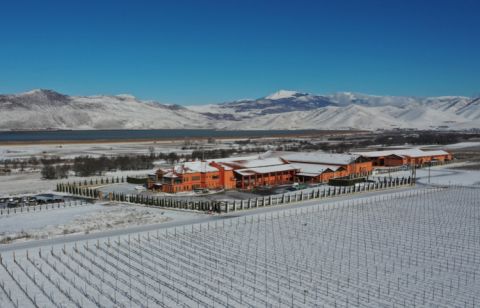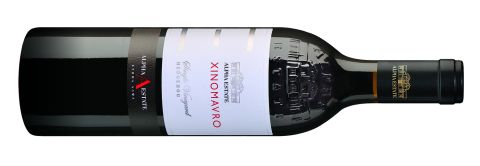If you want to know what pure, refreshing and yet ageworthy Xinomavro tastes like, try this widely available version from the high, windy plateau of Amyndeo in northern Greece, a region not far from the border with North Macedonia that I last visited in 2017. (See this World Atlas of Wine map of Greece for the exact location.)
It seems such an obvious candidate for wine of the week, not just because of its consistent quality from year to year but also because it is so widely available around the world (average annual production is 70,000–80,000 bottles per year), that I thought I better check to see if it had been one before. And it has: Jancis chose the 2010 vintage in 2015 and I chose the 2014/15 vintages in 2018.
But six years on, I can’t resist highlighting the 2021 vintage of this quintessential Xinomavro, unusually approachable and captivating in relative youth and still capable of ageing another 5–8 years in the bottle, probably longer.
The price has increased a bit since 2018 (when it was $18.49/£16.70) but it’s still good value for such a great introduction to a variety that is pale in colour, has high tannins and acidity, and is not always as delicious in youth as this one.
Alpha Estate has grown enormously since its first two experimental vintages in 2000 and 2001, thanks to the hard work and investment of Bordeaux- and Athens-trained winemaker Angelos Iatrides and fourth-generation vine-grower Makis Mavridis (along with considerable EU funding). They now have a greatly enlarged team – including next-generation Angeliki Iatridou and Emorfili Mavridou – and a bigger, state-of -the-art, gravity-fed winery (pictured at the top of the article, and under snow further down).
They started planting the vineyards at 620–710 m (2,034–2,330 ft) in elevation in 1997, slowly buying and pulling together 75 separate parcels to create a contiguous area of 49 ha (121 acres). Today they own and farm 220 ha (544 acres), including some ungrafted centenarian bush vines, for example in the Barba Yannis vineyard that was written about by Savvas Kyriakidis in our wine writing competition in 2021.
The vineyards may be extensive but they are cared for with great precision. One of their buzzwords is ‘ecosystem’ (also the name of their top range of wines, with vineyard co-ordinates on the label), referring to not only the physical environment and the grape variety but also to the human choices involved in the winegrowing process.
The climate here is semi-continental but the extremes of temperature – snow in winter and heat/low rainfall in the summer – are moderated by the two nearby lakes Petres and Vegoritis and by the regular north-westerly winds, which also help to keep the grapes healthy. I pointed out after my first visit to Alpha Estate in 2008 that ‘the elevation gives rise to a day–night temperature variation of 13–15 °C, thus lengthening the growing season and helping to retain freshness in the wines. Soils are poor and very sandy (up to 95% sand in some areas), thus very fast draining and low-yielding.’ This freshness is always a feature of the Hedgehog Xinomavro. As it is of the estate’s Barba Yannis Vieilles Vignes Reserve Xinomavro.
The Alpha team are deeply immersed in Xinomavro, the most important indigenous red-wine variety in northern Greece, ranking fourth out of the 300 indigenous varieties currently cultivated. Angeliki Iatridou’s thesis for her 2020/21 Master’s in viticulture and oenology at Montpellier and Turin was entitled ‘A comparison of 11 Xinomavro clones in relation to the berry maturation process, must and the final wine’.
The experimental block for the research into these clones was planted on the estate in 2016, and Alpha have now released two single-clone wines, clone 19 and clone 37, the ones they thought were most distinctive and best suited to being bottled separately. In the first vintage (2021) only 300 bottles of each were made so they can be bought only at the winery. They are so very different from each other, both delicious in their own ways. The aim of the research is not to produce lots of different single-clone wines but to be able to analyse the performance of each one under controlled conditions. In most circumstances – with any variety or region – a more ‘complete’ wine is the result of a mix of clones, either in the vineyard or in the winery.
The Hedgehog Xinomavro vines, which range from 6 to 37 years old, are, according to Iatridou, the result of a mass selection of cuttings from five subzones in the Amyndeo appellation that were taken before any analytical work had been done on clonal selection. The grapes are destemmed, given a short pre-fermentation cold soak of around five days at c 12 °C (54 °F) to extract colour, fruit aromas and tannins that are not too astringent. The must is then fermented in stainless-steel tanks and aged in French oak for 12 months. The 225-litre barrels are 50% second-use oak and 50% new oak, some low-toasted but most of them ‘white toasted’ (ie steamed rather than toasted over a fire) – which is why the oak flavour is so unobtrusive in this wine. The wine is left on the lees during much of that maturation period to add roundness and texture and help balance the wine. The final alcohol is 13.91%.
These objective winemaking details fail to convey the joy of this wine, which is light ruby in colour, vibrant with sweet and sour cherry, plus a hint of tomato leaf, so typical of this variety. It’s pure and juicy but sufficiently structured by the tannins and the acidity to drink with food, beautifully fresh and scented. Above all, it seems so unforced yet not in the least dumbed down to make it more accessible – you can really see the character of this variety and taste the climate that seems to suit it perfectly. If you have never tried Xinomavro, this is a good place to start.
Alpha’s UK importers are Maltby & Greek and Hallgarten and Novum Wines; in the US, Diamond Wine Imports, Chicago/Skurnik Wines, NY. On the Alpha website there is an extensive directory of importers and distributors by country, showing just how widely the wines are distributed.
Members may access many more tasting notes on Alpha Estate wines, and on wines made from Xinomavro, in our tasting notes database.
All photos courtesy of Alpha Estate.


















